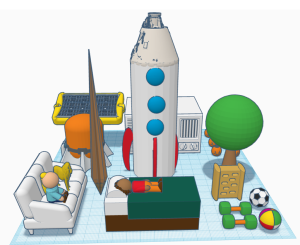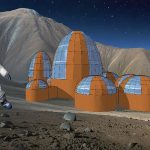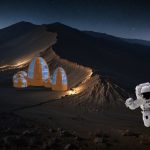COHETE VIVIENTE by EMANUEL CRACIUN
IES SEVERO OCHOA Elche-Alicante Spain 15 years old 1 / 0 Spanish Mars
External link for Tinkercad 3D design
Project description
En el TinkerCad se puede ver un cohete donde se podría vivir que se utilizará para el hábitat humano de una persona.
Yo he escogido que el hábitat humano sea en Marte ya que tiene unas buenas condiciones para un humano, que serían estas:
– Marte tiene una composición atmosférica con los componentes de dióxido de carbono, nitrógeno y argón. Y como tiene dióxido de carbono se podría plantar cultivos o árboles para convertirlo en oxígeno (los cultivos se alimentarán con agua que hablaré después).
– Marte tiene hielo de agua en los polos y en la región polar sur se ha detectado un estanque de agua líquida bajo capas de hielo y polvo. Eso significa que tendríamos agua (fusión de hielo).
– Utilizaríamos energía solar ya que Marte le llega la luz del sol.
– Fuera del cohete podríamos hacer cultivos, como por ejemplo calabazas ya que Marte tiene buenas tierras (esta idea me he inspirado de la película Marte, pero en vez de patatas calabazas).
– El cohete estaría preparada para las temperaturas de Marte (la temperatura de Marte es de -153°C a 20°C) y su radiación (que es alta) gracias a la tecnología de hoy en día.
– El trabajo en el cohete sería reforzarse físicamente haciendo ejercicio y descansar, y en el exterior sería conseguir agua y los cultivos.
– Para comunicarnos con la Tierra tendríamos las bandas UHF y VHF.
– En el cohete, además de poder vivir las personas también podrían los animales, como por ejemplo los perros ya que han ido varias veces a la Luna.
– En el cohete tendríamos también un gimnasio para mantenernos en forma, unas habitaciones donde podríamos dormir y un huerto donde poder plantar.
– La presión atmosférica de Marte es de 600Pa, lo que significa que podríamos andar por Marte o saltar sin el miedo de ir al espacio. También Marte no tiene campo magnético.
La aceleración de la gravedad es de 3,7 más, el movimiento es más lento que en la tierra.
English translation
In the TinkerCad you can see a liveable rocket that will be used for a person’s human habitat.
I have chosen that the human habitat is on Mars since it has good conditions for a human, which would be these:
– Mars has an atmospheric composition with the components of carbon dioxide, nitrogen and argon. And since it has carbon dioxide, crops or trees could be planted to convert it into oxygen (the crops will be fed with water, which I will talk about later).
– Mars has water ice at the poles and in the south polar region a pool of liquid water has been detected under layers of ice and dust. That means we would have water (melting ice).
– We would use solar energy since Mars receives sunlight.
– Outside the rocket we could grow crops, such as pumpkins since Mars has good soil (I was inspired by the movie Mars, but pumpkins instead of potatoes).
– The rocket would be prepared for the temperatures of Mars (the temperature of Mars is -153°C to 20°C) and its radiation (which is high) thanks to today’s technology.
– The work on the rocket would be to strengthen oneself physically by exercising and resting, and on the outside it would be getting water and crops.
– To communicate with the Earth we would have the UHF and VHF bands.
– In the rocket, in addition to people being able to live, animals could also live, such as dogs since they have been to the Moon several times.
– In the rocket we would also have a gym to keep in shape, some rooms where we could sleep and a garden where we could plant.
– The atmospheric pressure of Mars is 600Pa, which means that we could walk on Mars or jump without the fear of going into space. Also Mars has no magnetic field.
The acceleration of gravity is 3.7 times more, the movement is slower than on Earth.
#3D Design
Other Projects
zona de construccion virtual









